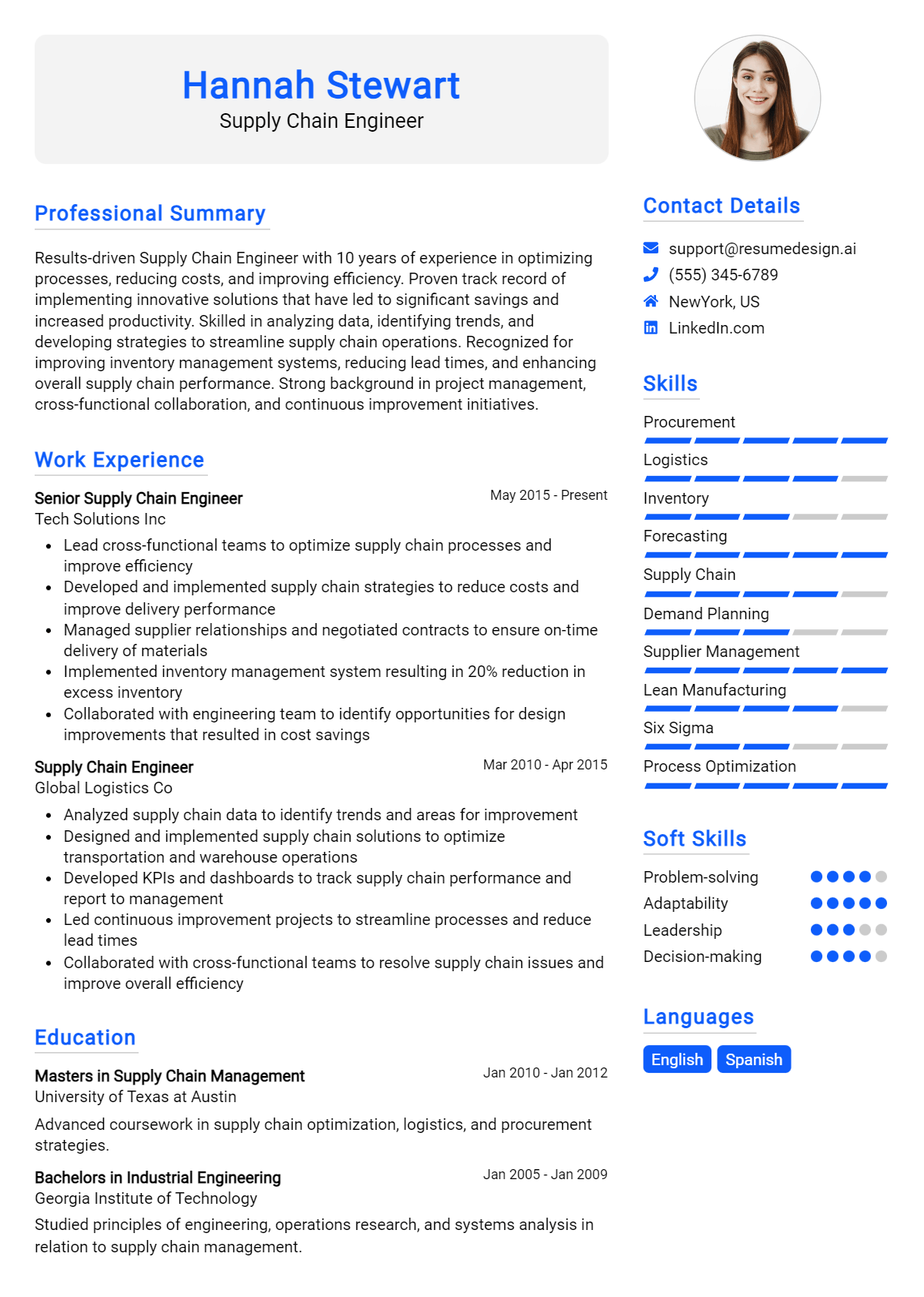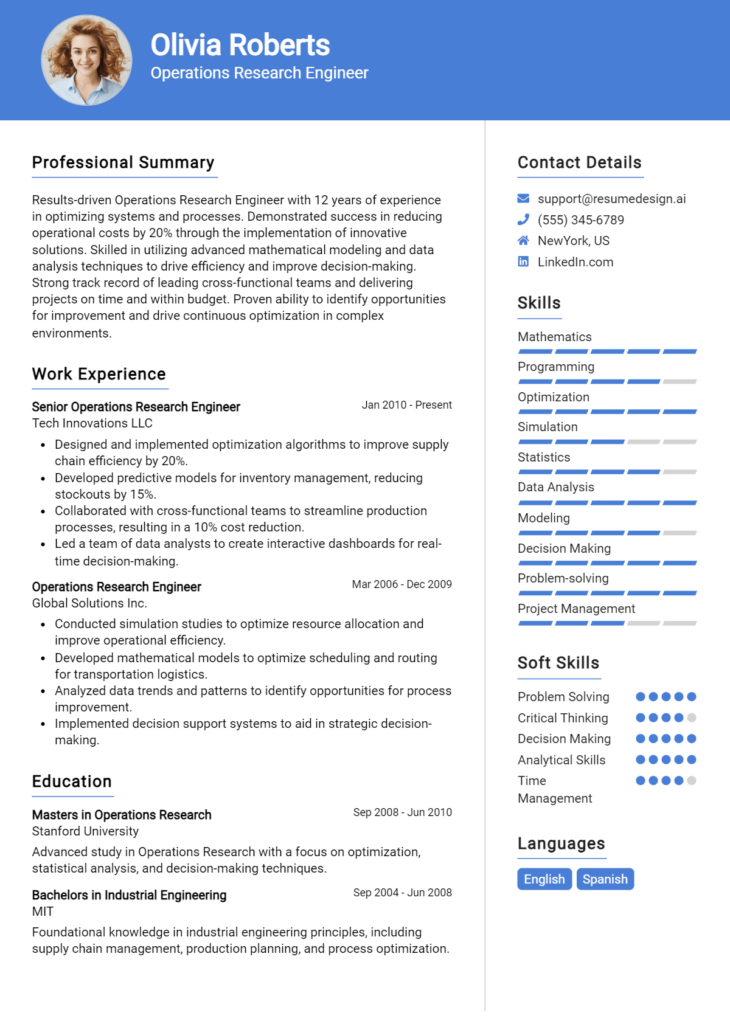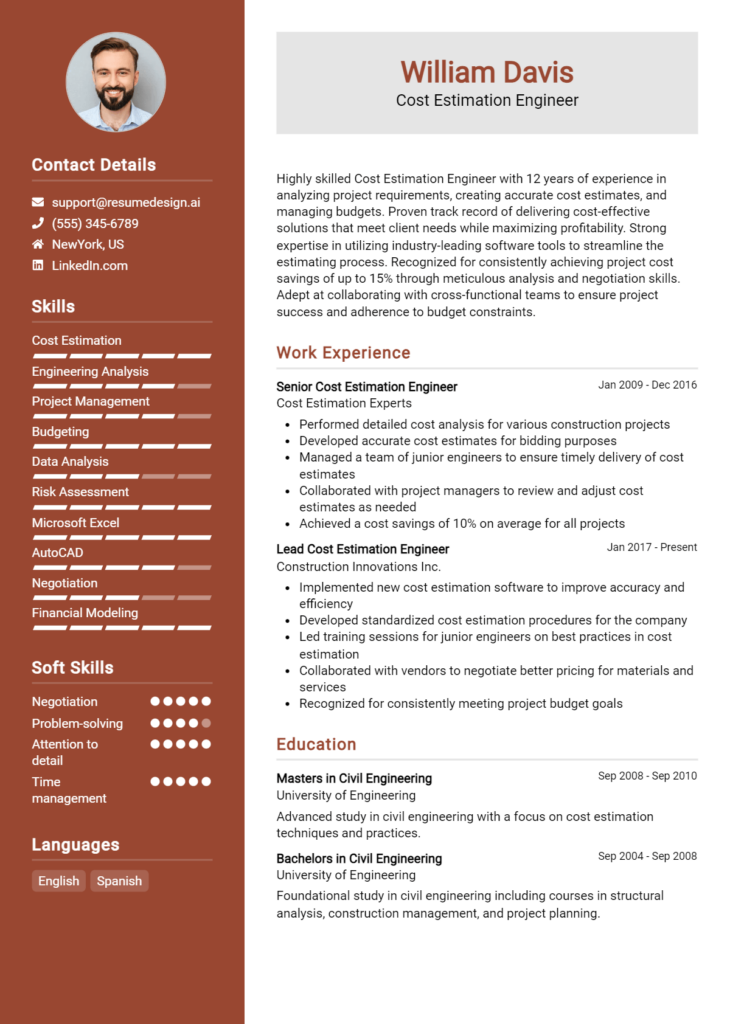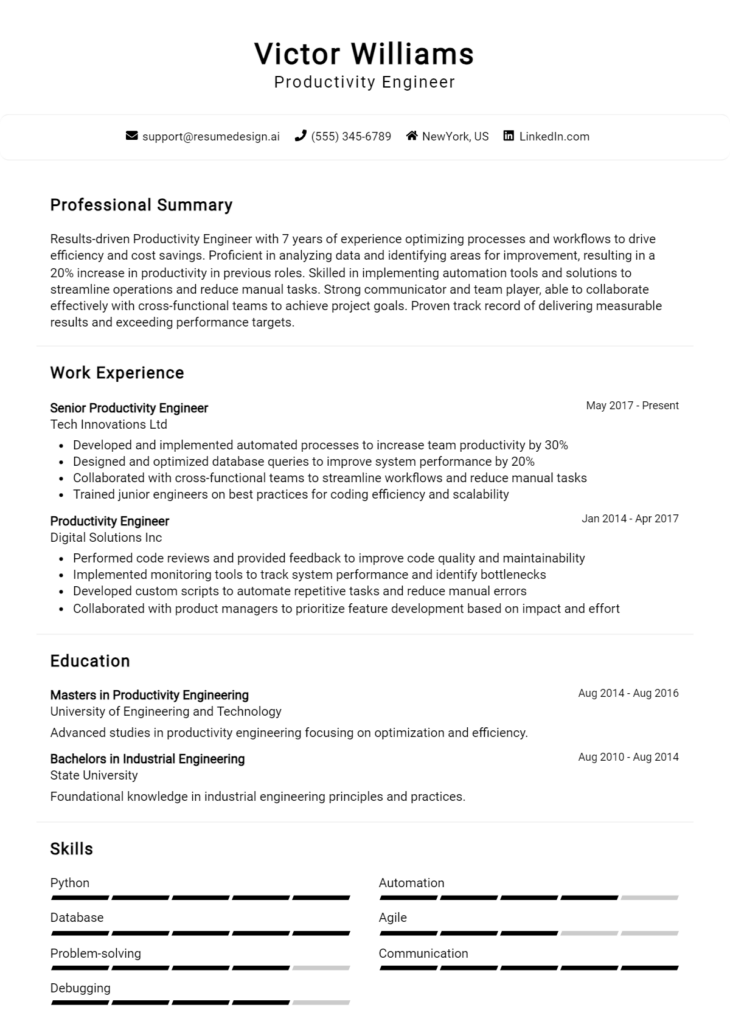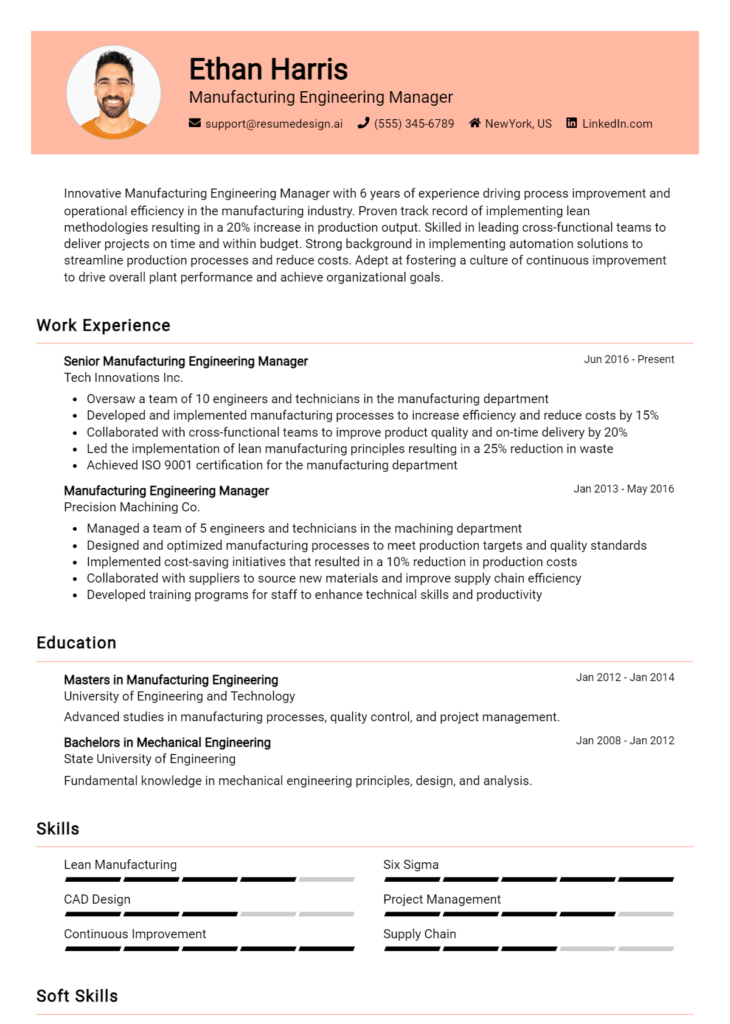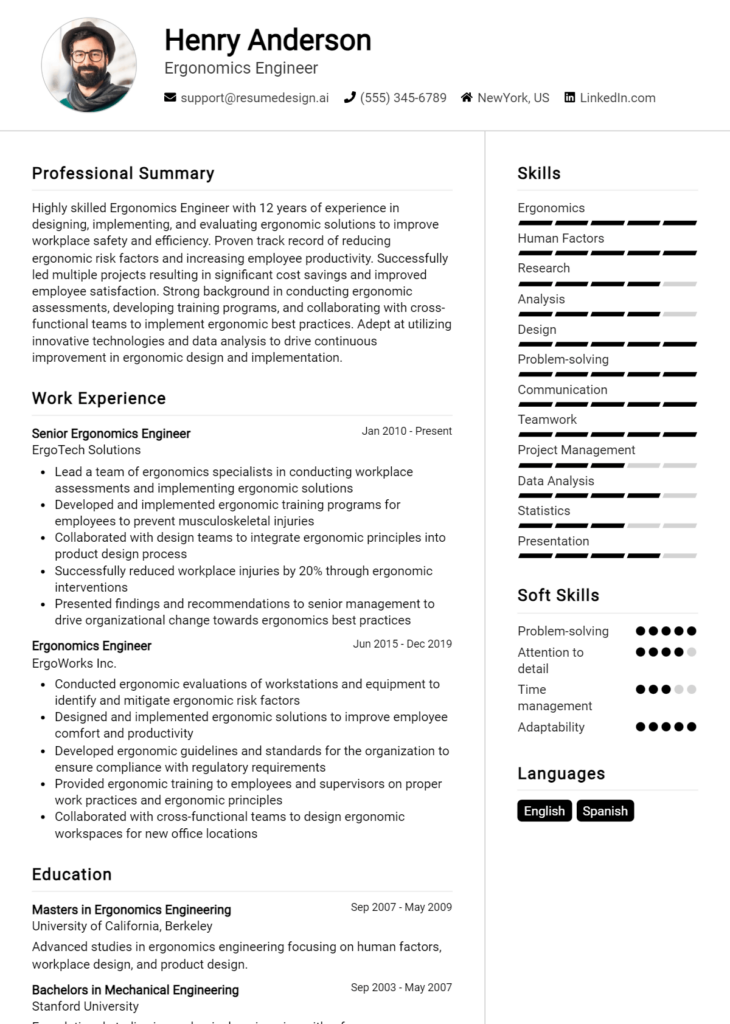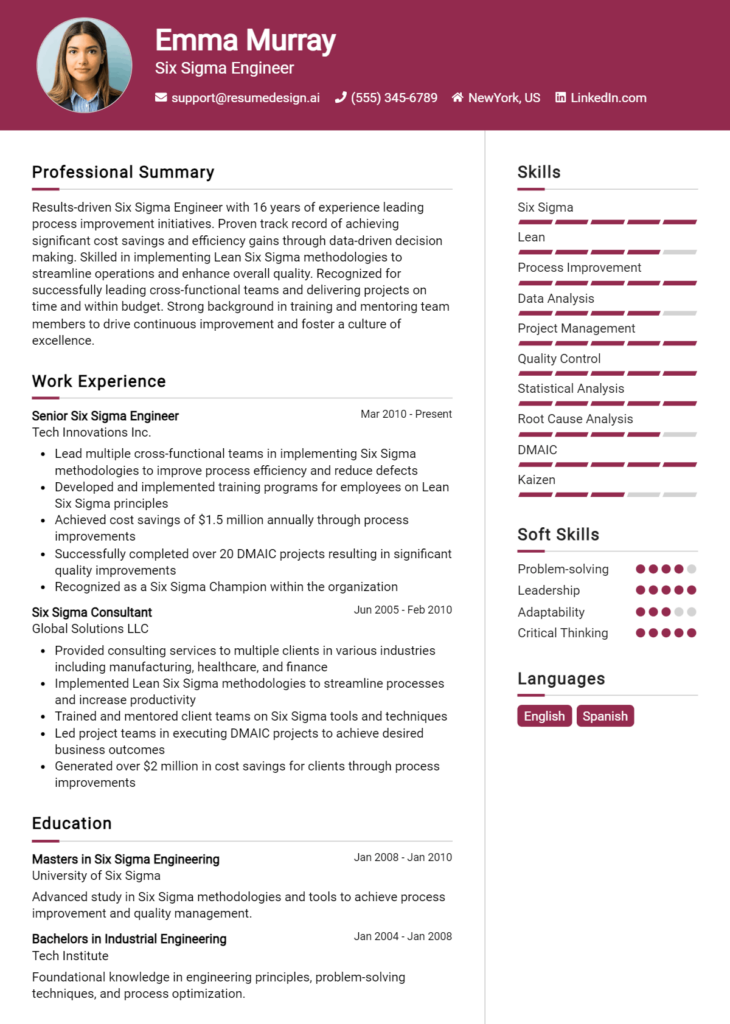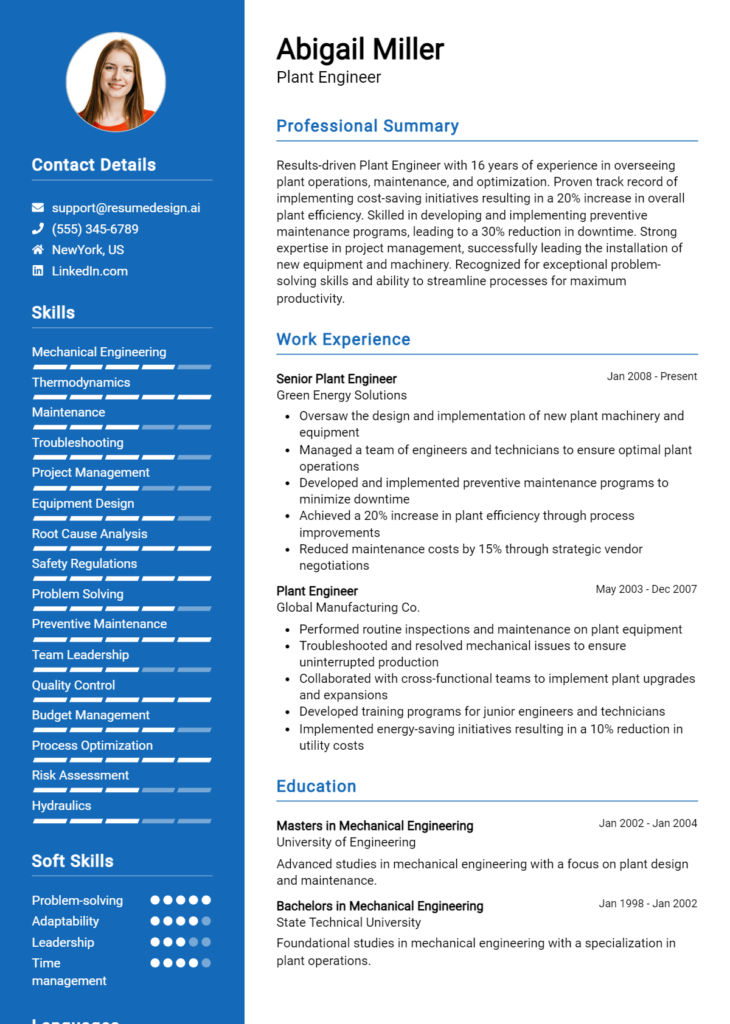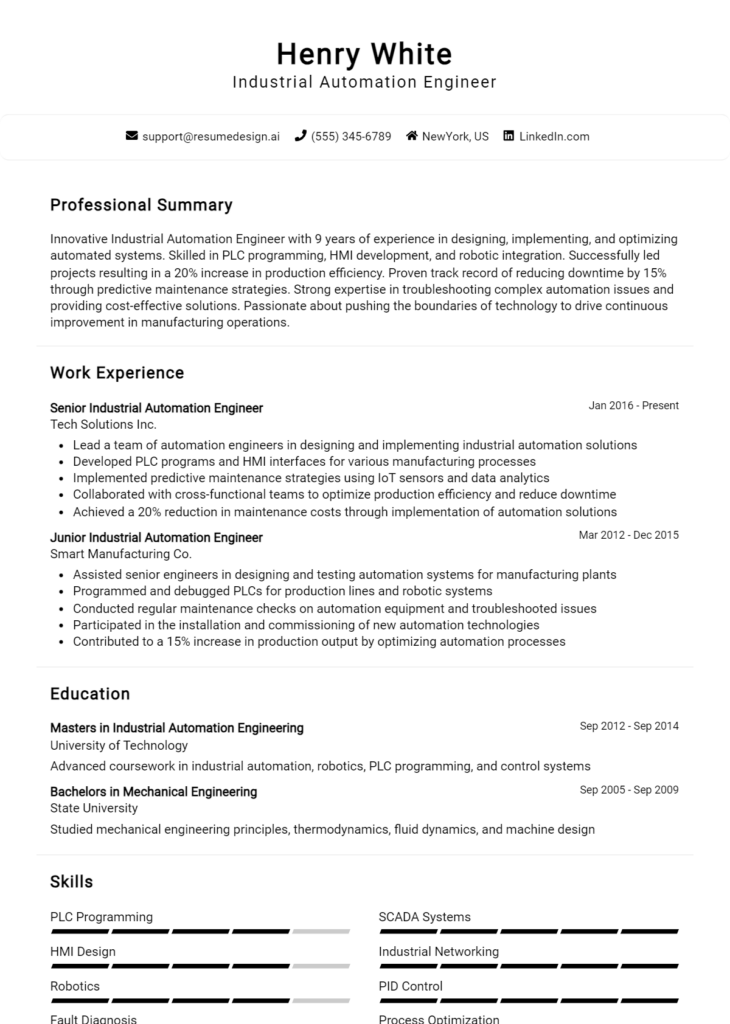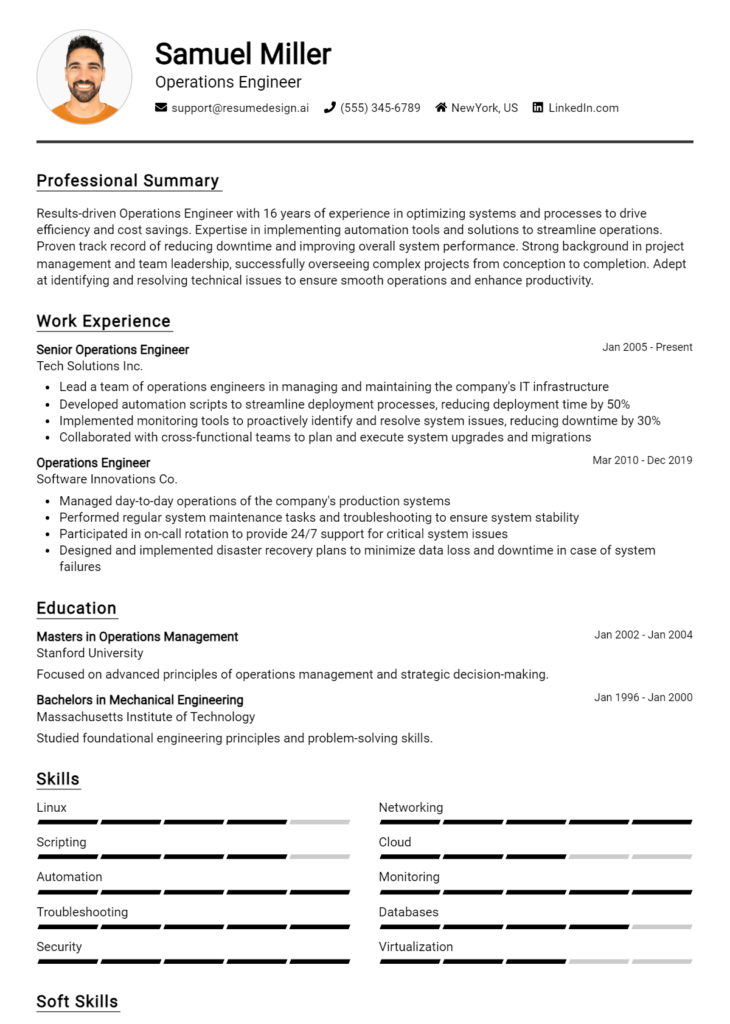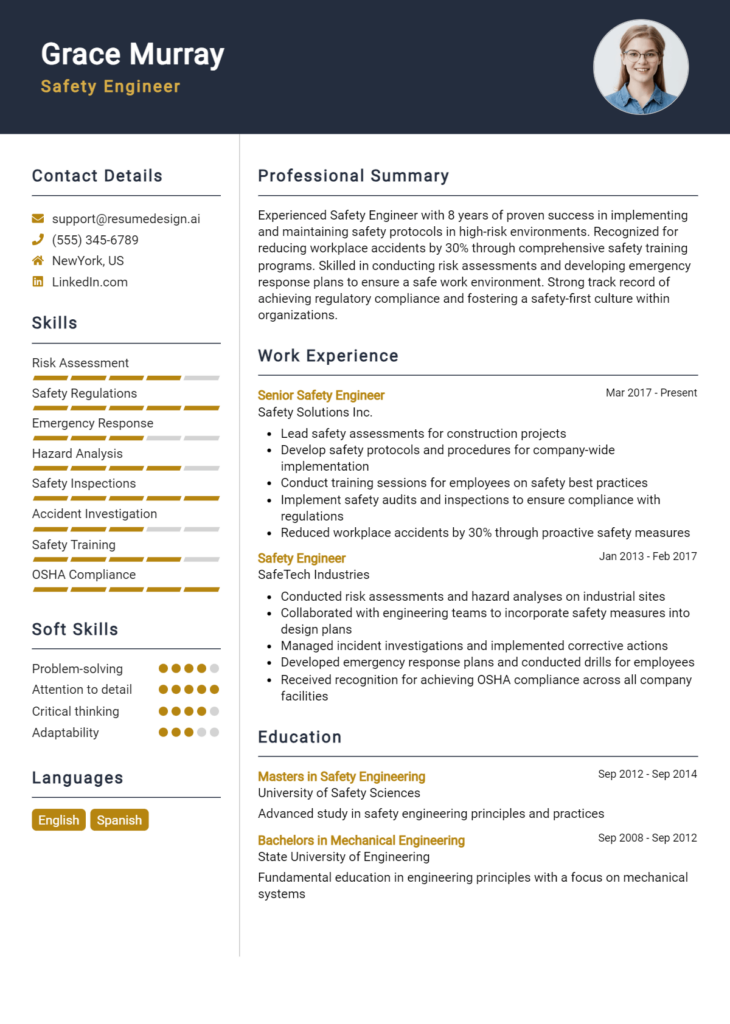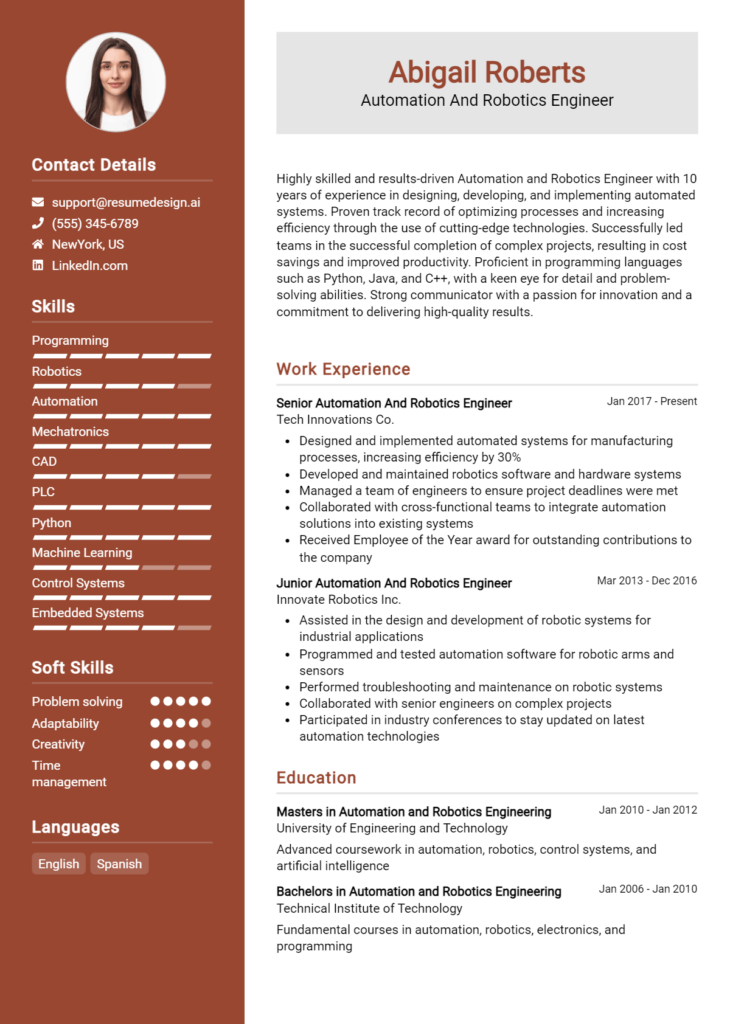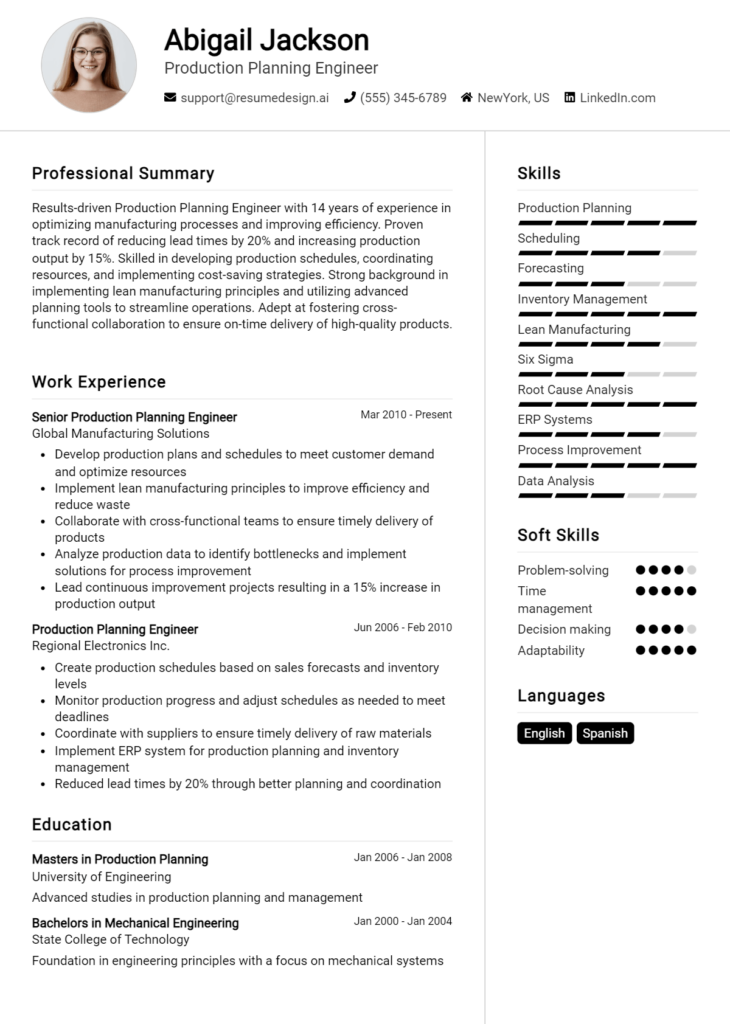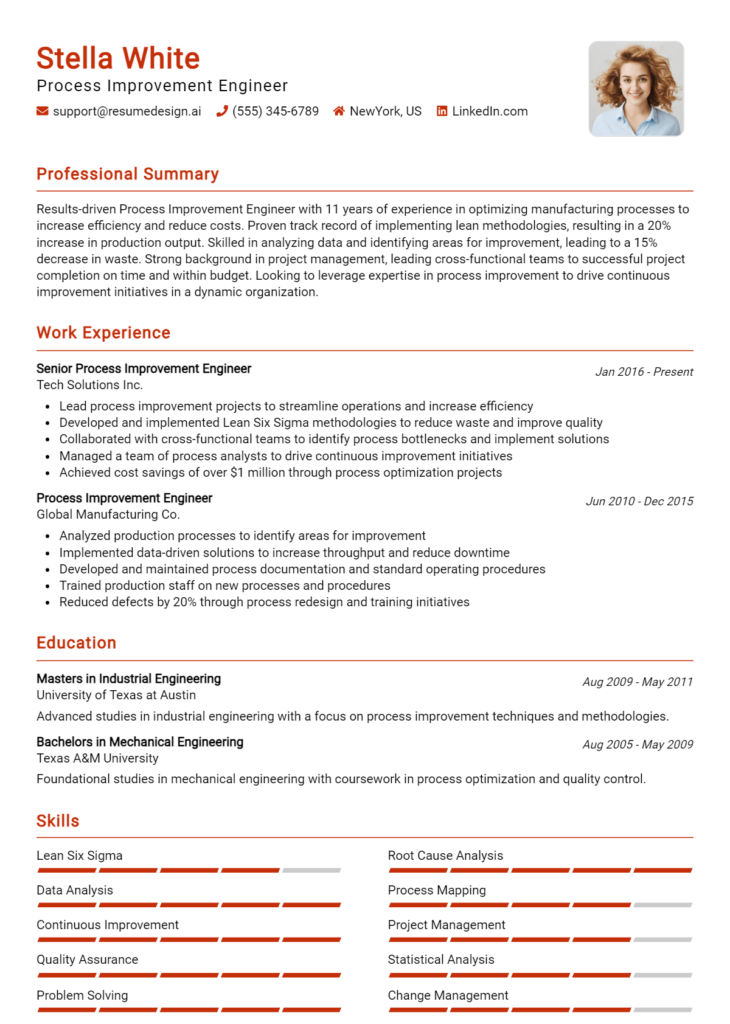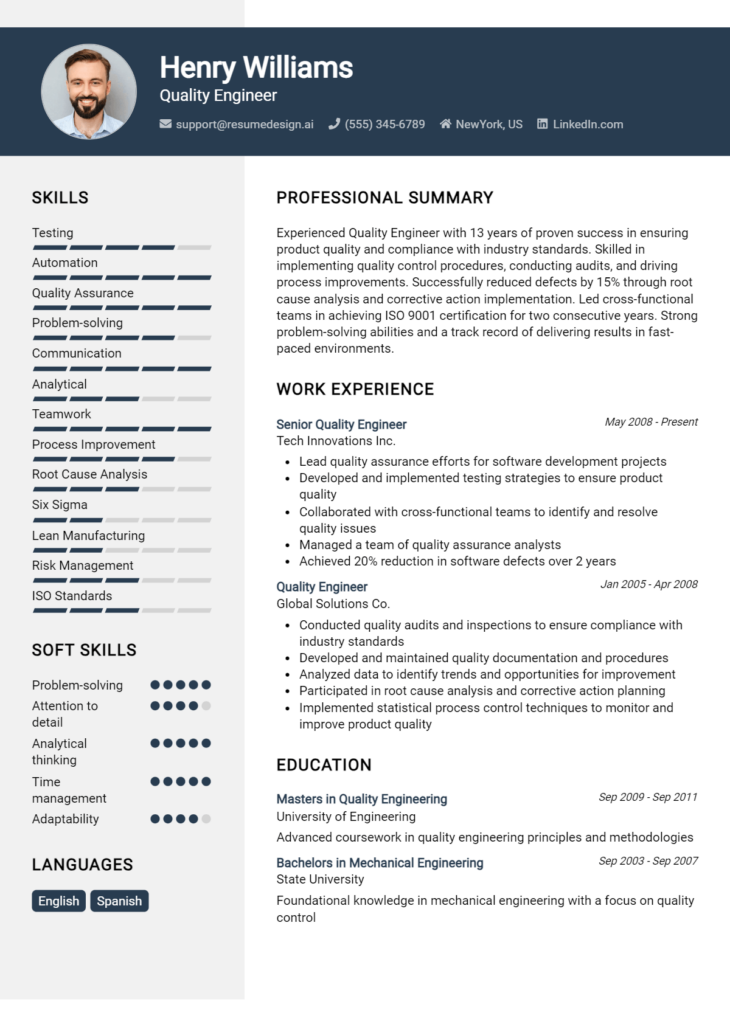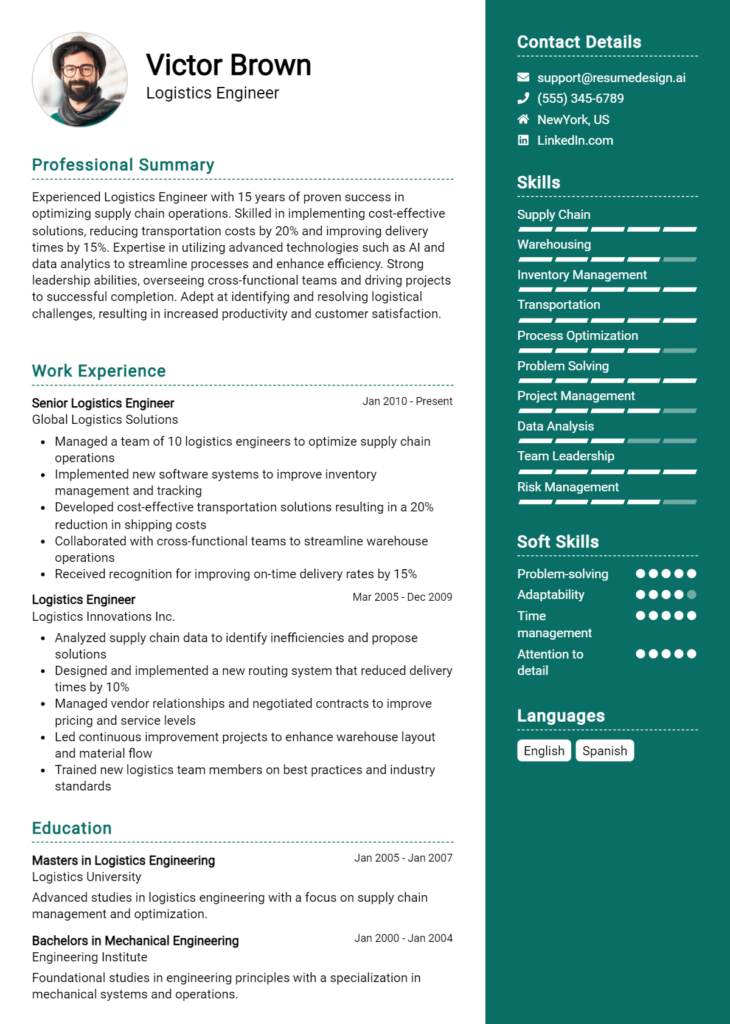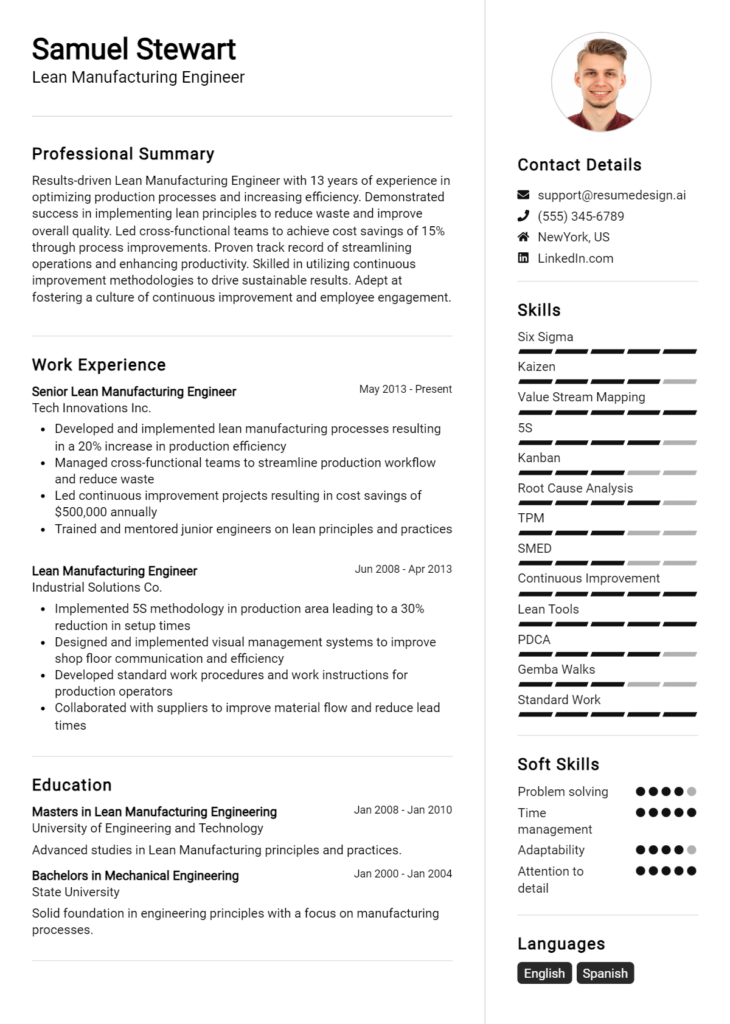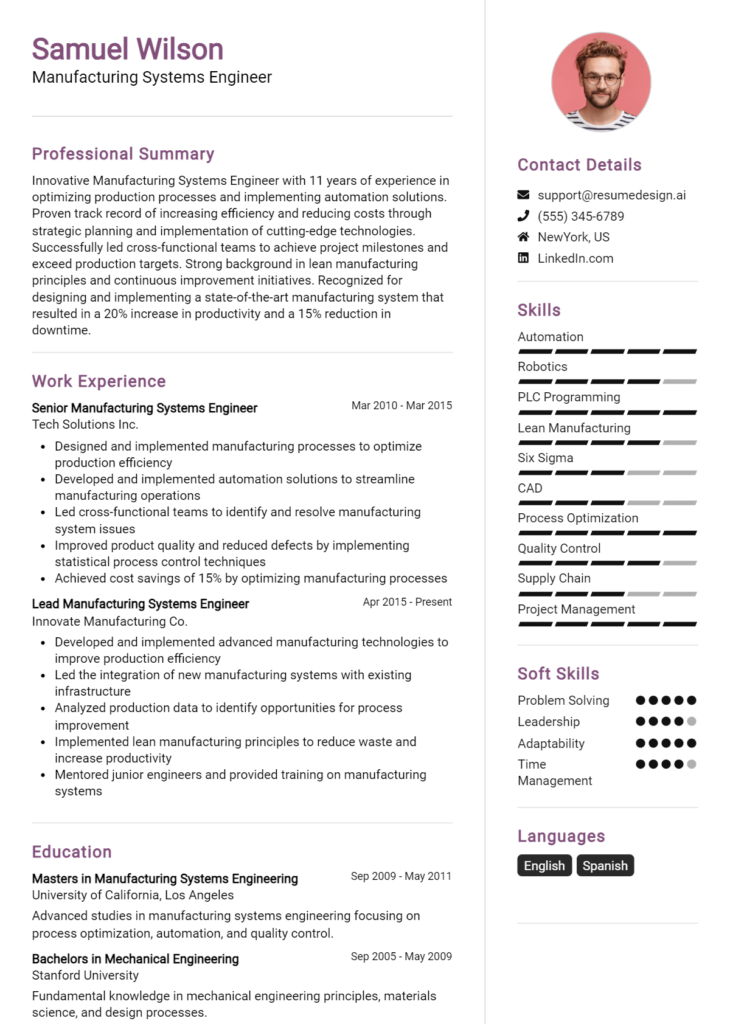Supply Chain Engineer Core Responsibilities
A Supply Chain Engineer plays a critical role in optimizing supply chain processes by bridging various departments such as procurement, logistics, and production. Their core responsibilities include analyzing operations, designing efficient systems, and implementing solutions to enhance productivity. This role demands strong technical, operational, and problem-solving skills to address complex challenges and contribute to the organization’s efficiency and profitability. A well-structured resume effectively highlights these qualifications, showcasing the candidate's ability to drive success across functions.
Common Responsibilities Listed on Supply Chain Engineer Resume
- Develop and implement supply chain strategies to optimize performance.
- Analyze data to identify inefficiencies and recommend improvements.
- Collaborate with cross-functional teams to ensure seamless operations.
- Monitor inventory levels and manage procurement processes.
- Conduct cost analysis and budget management for projects.
- Utilize software tools for supply chain modeling and forecasting.
- Design and improve logistics processes for better delivery efficiency.
- Ensure compliance with industry regulations and quality standards.
- Identify and mitigate risks within the supply chain.
- Train and guide team members on best practices.
- Prepare reports and presentations for stakeholders.
High-Level Resume Tips for Supply Chain Engineer Professionals
A well-crafted resume is crucial for Supply Chain Engineer professionals, as it often serves as the first impression a candidate makes on a potential employer. In a competitive job market, your resume needs to effectively showcase not only your technical skills but also your achievements and contributions to previous roles. A strong resume can highlight your ability to optimize processes, manage logistics, and drive efficiency—key attributes that employers seek in supply chain professionals. This guide will provide practical and actionable resume tips specifically tailored for Supply Chain Engineer professionals, ensuring you stand out to recruiters and hiring managers.
Top Resume Tips for Supply Chain Engineer Professionals
- Tailor your resume to the job description by incorporating relevant keywords and phrases that match the specific role.
- Highlight your relevant experience by focusing on positions that showcase your supply chain expertise.
- Quantify your achievements with specific metrics, such as cost savings, time reductions, or process improvements.
- Include industry-specific skills, such as proficiency in supply chain software (e.g., SAP, Oracle) and familiarity with lean methodologies.
- Utilize a clean and professional format that enhances readability and allows key information to stand out.
- Incorporate a strong summary statement at the top of your resume that encapsulates your career goals and key qualifications.
- Showcase certifications relevant to the supply chain field, such as APICS CPIM or Six Sigma Green Belt, to enhance your credibility.
- List relevant projects or initiatives you've led to demonstrate leadership and problem-solving capabilities.
- Keep your resume concise, ideally one page, focusing on the most impactful information.
- Proofread your resume multiple times to eliminate any spelling or grammatical errors that could detract from your professionalism.
Implementing these tips can significantly increase your chances of landing a job in the Supply Chain Engineer field. By presenting a resume that effectively highlights your skills, achievements, and relevant experiences, you position yourself as a strong candidate capable of meeting the demands of the role and contributing to the success of the organization.
Why Resume Headlines & Titles are Important for Supply Chain Engineer
In the competitive field of supply chain engineering, a well-crafted resume headline or title plays a crucial role in capturing the attention of hiring managers. A strong headline serves as the first impression, succinctly summarizing a candidate's key qualifications and professional identity in one impactful phrase. It should be concise, directly related to the job being applied for, and relevant to the supply chain sector. By effectively highlighting essential skills and experiences, a compelling resume title can differentiate a candidate from the competition, making it more likely for hiring managers to delve deeper into their resume.
Best Practices for Crafting Resume Headlines for Supply Chain Engineer
- Keep it concise: Aim for a headline that is brief yet informative, ideally no longer than one sentence.
- Be specific: Tailor the headline to reflect the specific role you are applying for, using keywords from the job description.
- Highlight key strengths: Focus on your top skills or accomplishments that align with the supply chain engineering role.
- Use industry terminology: Incorporate relevant industry jargon to demonstrate your familiarity with the field.
- Quantify achievements: If possible, include numbers or metrics that showcase your impact in previous roles.
- Avoid generic phrases: Steer clear of vague descriptors that do not provide insight into your capabilities.
- Maintain professionalism: Ensure the tone is formal and reflects your professional persona.
- Revise regularly: Update your headline to match the specific job requirements you are targeting.
Example Resume Headlines for Supply Chain Engineer
Strong Resume Headlines
"Results-Driven Supply Chain Engineer with 8+ Years of Experience in Lean Manufacturing and Process Optimization"
“Certified Supply Chain Professional with Proven Success in Cost Reduction and Supplier Relationship Management”
“Innovative Supply Chain Engineer Specializing in Data Analytics and Inventory Management Solutions”
Weak Resume Headlines
“Supply Chain Engineer Looking for Opportunities”
“Experienced Professional in Supply Chain”
The strong headlines are effective because they provide clear, specific information about the candidate's skills and experiences, immediately communicating their value to potential employers. They use actionable language and industry-specific terms, which helps to establish credibility. In contrast, the weak headlines lack clarity and specificity, making it difficult for hiring managers to understand the candidate's unique strengths or how they fit the role. By avoiding generic phrases, candidates can ensure their resumes stand out in a crowded job market.
Writing an Exceptional Supply Chain Engineer Resume Summary
A well-crafted resume summary is crucial for Supply Chain Engineers, as it serves as the first impression a hiring manager will have of a candidate's qualifications. A strong summary quickly captures attention by succinctly showcasing key skills, relevant experience, and notable accomplishments that align with the job role. This brief yet impactful introduction offers a snapshot that can set the tone for the rest of the resume, making it essential to tailor the summary to the specific job being applied for. A targeted summary not only highlights the candidate's strengths but also demonstrates their understanding of the position and the value they can bring to the organization.
Best Practices for Writing a Supply Chain Engineer Resume Summary
- Quantify Achievements: Use numbers to illustrate successes, such as cost savings or efficiency improvements.
- Focus on Key Skills: Highlight critical skills that are relevant to supply chain management, such as logistics, inventory control, and process optimization.
- Tailor for the Job Description: Customize the summary to reflect the specific requirements and expectations outlined in the job posting.
- Be Concise: Aim for 2-4 sentences that clearly and effectively communicate your value.
- Showcase Relevant Experience: Mention specific roles or projects that align with the supply chain engineering field.
- Use Action-Oriented Language: Start sentences with strong action verbs to convey impact and proactivity.
- Highlight Certifications and Education: Include relevant qualifications or certifications that enhance your candidacy.
- Reflect Industry Knowledge: Demonstrate familiarity with industry trends or technologies that are applicable to the position.
Example Supply Chain Engineer Resume Summaries
Strong Resume Summaries
Results-driven Supply Chain Engineer with over 7 years of experience in optimizing logistics operations, achieving a 30% reduction in transportation costs through strategic route planning and vendor negotiations.
Detail-oriented Supply Chain Engineer skilled in inventory management and production planning, successfully implementing a just-in-time system that improved inventory turnover by 25% and reduced carrying costs.
Dynamic Supply Chain Engineer with expertise in process improvement and cross-functional team leadership, leading a project that enhanced supply chain efficiency by 40%, resulting in significant cost savings and increased customer satisfaction.
Innovative Supply Chain Engineer with a proven track record in data analysis and demand forecasting, utilizing advanced analytics tools to achieve a 20% increase in forecast accuracy and drive better inventory decisions.
Weak Resume Summaries
Experienced engineer looking for a supply chain position where I can use my skills.
Supply Chain Engineer with some experience in logistics and inventory management, seeking to contribute to a company.
The strong resume summaries are considered effective because they include quantifiable results, specific skills, and direct relevance to the Supply Chain Engineer role. They demonstrate the candidate's achievements and understanding of the industry, making them stand out to hiring managers. In contrast, the weak summaries lack specificity, measurable outcomes, and appear generic, which fails to capture the reader's interest or highlight the candidate's true potential.
Work Experience Section for Supply Chain Engineer Resume
The work experience section of a Supply Chain Engineer resume is critical as it provides prospective employers with a comprehensive overview of the candidate's professional background and capabilities. This section highlights key technical skills essential for managing supply chain processes, demonstrates the ability to lead teams effectively, and showcases a commitment to delivering high-quality products. It is vital to quantify achievements wherever possible and to align past experiences with current industry standards to illustrate the candidate's qualifications clearly and compellingly.
Best Practices for Supply Chain Engineer Work Experience
- Start each bullet point with strong action verbs to convey initiative and impact.
- Quantify results whenever possible, using metrics like cost savings, efficiency improvements, or project timelines.
- Highlight specific technical skills that are relevant to the positions you are applying for, such as software proficiency or methodologies.
- Emphasize teamwork and collaboration by detailing cross-functional projects or team leadership roles.
- Tailor your work experience to match the requirements of the job description, focusing on relevant experiences.
- Include any certifications or specialized training that enhance your qualifications in supply chain management.
- Use concise and clear language to ensure that your achievements are easily understood.
- Maintain a consistent format throughout the section for professionalism and readability.
Example Work Experiences for Supply Chain Engineer
Strong Experiences
- Led a team of 8 in the implementation of a new inventory management system, reducing excess inventory by 25% and saving $150,000 annually.
- Developed and executed a logistics optimization plan that improved delivery efficiency by 15%, resulting in a 30% reduction in shipping costs.
- Managed cross-departmental collaboration for a product launch that met all timelines, contributing to a 20% increase in market share within the first quarter.
Weak Experiences
- Responsible for supply chain tasks and some team management.
- Worked on projects related to inventory but did not have any significant impact.
- Assisted in improving processes occasionally.
The examples labeled as strong experiences demonstrate clear achievements with quantifiable outcomes, showcasing technical leadership and collaboration across teams. In contrast, the weak experiences are vague and fail to illustrate specific contributions or measurable results, making them less impactful to potential employers.
Education and Certifications Section for Supply Chain Engineer Resume
The education and certifications section of a Supply Chain Engineer resume plays a crucial role in establishing the candidate's qualifications and readiness for the position. This section not only showcases the academic background of the applicant but also highlights industry-relevant certifications and ongoing learning initiatives. By providing details about relevant coursework, specialized training, and certifications, candidates can significantly enhance their credibility and demonstrate alignment with the specific requirements of the job role. This not only reassures potential employers of the candidate's expertise but also illustrates their commitment to professional development within the supply chain field.
Best Practices for Supply Chain Engineer Education and Certifications
- Prioritize relevant degrees such as a Bachelor's or Master's in Supply Chain Management, Industrial Engineering, or a related field.
- Include industry-recognized certifications, such as APICS Certified Supply Chain Professional (CSCP) or Lean Six Sigma Green Belt.
- Detail relevant coursework that directly applies to supply chain operations, logistics, or systems engineering.
- Highlight any specialized training or workshops that enhance technical skills related to supply chain processes.
- Use clear and concise formatting to ensure easy readability and quick reference for hiring managers.
- Keep the section updated with the latest certifications and degrees obtained to reflect continuous learning.
- Consider including GPA if it is impressive, particularly for recent graduates.
- Provide context for certifications by mentioning the issuing organization and the date obtained.
Example Education and Certifications for Supply Chain Engineer
Strong Examples
- Bachelor of Science in Supply Chain Management, University of Michigan, 2021
- APICS Certified Supply Chain Professional (CSCP), 2022
- Lean Six Sigma Green Belt Certification, 2023
- Relevant Coursework: Logistics Management, Operations Research, Inventory Control
Weak Examples
- Associate Degree in General Studies, Community College, 2015
- Certificate in Basic Office Skills, 2016
- High School Diploma, 2010
- Outdated Certification in Basic Supply Chain Fundamentals, 2018
The strong examples provided are considered effective because they directly align with the qualifications needed for a Supply Chain Engineer role, showcasing relevant degrees and up-to-date certifications that indicate a mastery of supply chain concepts. In contrast, the weak examples are less impactful as they include irrelevant qualifications or outdated certifications that do not contribute to the candidate's suitability for the position, potentially raising concerns about their commitment to the field.
Top Skills & Keywords for Supply Chain Engineer Resume
In the competitive landscape of supply chain management, crafting a compelling resume as a Supply Chain Engineer requires a keen focus on skills. Highlighting both hard and soft skills is essential, as these attributes demonstrate not only technical proficiency but also the ability to collaborate and innovate in a dynamic environment. A well-rounded skill set can set candidates apart, making their resumes stand out to potential employers. By showcasing the right combination of skills, candidates can effectively communicate their value and suitability for the role, enhancing their chances of landing interviews and, ultimately, job offers.
Top Hard & Soft Skills for Supply Chain Engineer
Soft Skills
- Analytical thinking
- Problem-solving
- Communication skills
- Team collaboration
- Attention to detail
- Adaptability
- Time management
- Leadership abilities
- Negotiation skills
- Conflict resolution
Hard Skills
- Supply chain optimization
- Inventory management
- Data analysis and interpretation
- Project management
- Lean manufacturing techniques
- ERP software proficiency
- Demand forecasting
- Quality assurance processes
- Logistics and transportation management
- Statistical analysis tools
For a comprehensive look at how to effectively integrate these skills into your resume, alongside relevant work experience, it’s crucial to illustrate how these competencies have been applied in real-world scenarios. This approach not only enhances your resume but also provides a clearer picture of your potential contributions to a prospective employer.
Stand Out with a Winning Supply Chain Engineer Cover Letter
I am writing to express my interest in the Supply Chain Engineer position at [Company Name], as advertised on [where you found the job listing]. With a solid background in supply chain management and a passion for optimizing processes, I am excited about the opportunity to contribute to your team. My experience in analyzing supply chain operations and implementing innovative solutions aligns well with your company's commitment to efficiency and excellence.
In my previous role at [Previous Company Name], I successfully led a project that resulted in a 20% reduction in logistics costs through the implementation of a new inventory management system. By utilizing data analytics and collaboration with cross-functional teams, I was able to identify bottlenecks in the supply chain and propose actionable strategies. This experience honed my skills in process improvement, demand forecasting, and vendor management, all of which I believe will be valuable in addressing the challenges at [Company Name].
I am particularly impressed by [Company Name]'s dedication to sustainability and cutting-edge technology in supply chain processes. I am eager to bring my expertise in lean manufacturing and continuous improvement methodologies to help drive these initiatives forward. I am confident that my analytical mindset, coupled with my strong communication skills, will allow me to effectively collaborate with your team and contribute to [specific project or goal of the company].
Thank you for considering my application. I look forward to the opportunity to discuss how my background, skills, and enthusiasms align with the goals of [Company Name]. I am excited about the possibility of contributing to your innovative supply chain solutions and am eager to bring my unique perspective to your esteemed organization.
Common Mistakes to Avoid in a Supply Chain Engineer Resume
When crafting a resume for a Supply Chain Engineer position, it's essential to present your skills and experiences effectively. Unfortunately, many candidates make common mistakes that can undermine their chances of landing an interview. By avoiding these pitfalls, you can create a more compelling resume that highlights your qualifications and sets you apart from the competition. Here are some common mistakes to watch out for:
Generic Objective Statements: Using a one-size-fits-all objective statement can make your resume feel impersonal. Tailor your objective to reflect the specific role and how your skills align with the company's needs.
Lack of Quantifiable Achievements: Simply stating your responsibilities doesn't demonstrate your impact. Use metrics to quantify your achievements, such as cost savings or efficiency improvements, to showcase your contributions effectively.
Ignoring Technical Skills: Supply Chain Engineering often requires specific technical skills. Failing to list relevant software, tools, or methodologies can make your resume less competitive. Be sure to highlight your proficiency in tools like ERP systems, data analysis software, or supply chain modeling methods.
Overly Complex Language: Using jargon or overly technical language can alienate hiring managers who may not be familiar with industry-specific terms. Strive for clarity and conciseness while still demonstrating your expertise.
Inconsistent Formatting: A poorly formatted resume can distract from your qualifications. Ensure consistency in font type, size, bullet points, and spacing to create a professional appearance.
Neglecting Soft Skills: While technical skills are crucial, soft skills like communication, teamwork, and problem-solving are equally important in supply chain roles. Be sure to include examples that demonstrate these abilities.
Omitting Relevant Experience: Sometimes, candidates overlook relevant experiences that may not be directly related to their last job title. Include internships, volunteer work, or projects that showcase your supply chain knowledge and skills.
Failing to Customize for Each Application: Sending out the same resume for multiple applications can be a missed opportunity. Tailor your resume for each job by aligning your experiences and skills with the specific job description to increase your chances of success.
Conclusion
As we conclude our exploration of the Supply Chain Engineer role, it's clear that this position is integral to the efficiency and effectiveness of an organization's operations. Key responsibilities include optimizing supply chain processes, managing logistics, and ensuring that materials flow smoothly from suppliers to customers. Additionally, a strong understanding of data analysis and technology integration is essential for success in this field.
Given the competitive nature of the job market, it's crucial for professionals in this domain to have a polished and impactful resume that effectively showcases their skills and experiences. As you reflect on your qualifications and experiences, consider reviewing your Supply Chain Engineer resume to ensure it aligns with industry standards and highlights your unique strengths.
To assist you in this process, a variety of resources are available. Explore resume templates to find a design that suits your style, or utilize the resume builder for a step-by-step approach to creating a professional document. Additionally, browsing through resume examples can provide inspiration on how to effectively present your qualifications. Don’t forget to enhance your application with a compelling cover letter using our cover letter templates.
Take action today—review your resume and leverage these tools to elevate your application and stand out in the competitive field of supply chain engineering!

